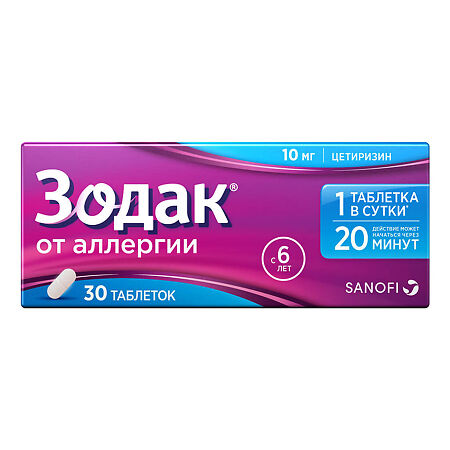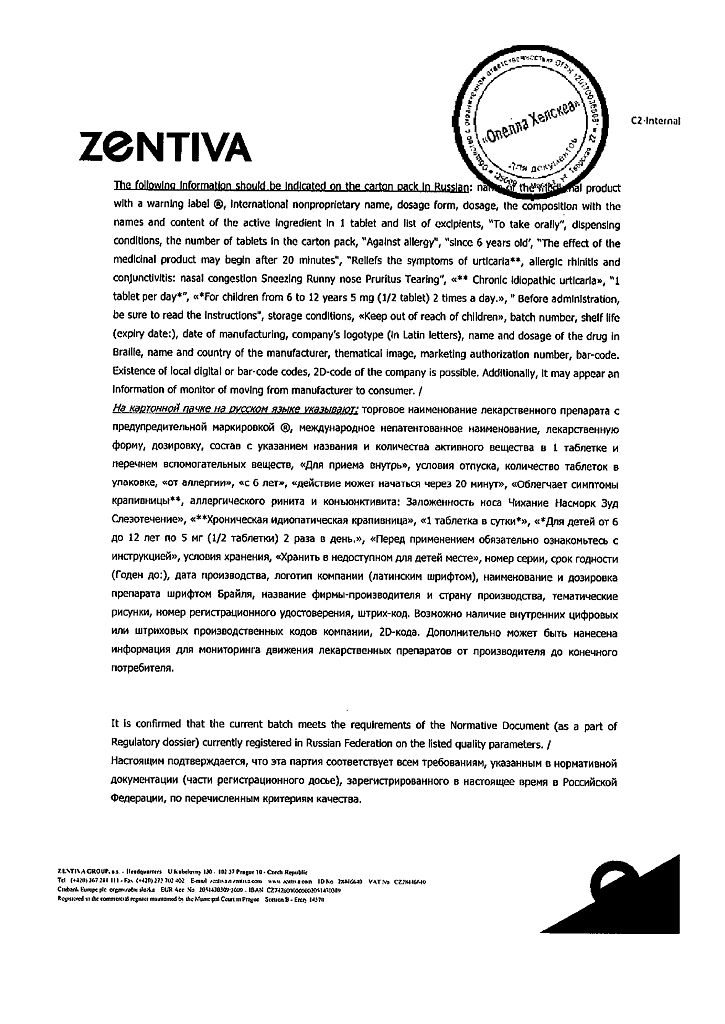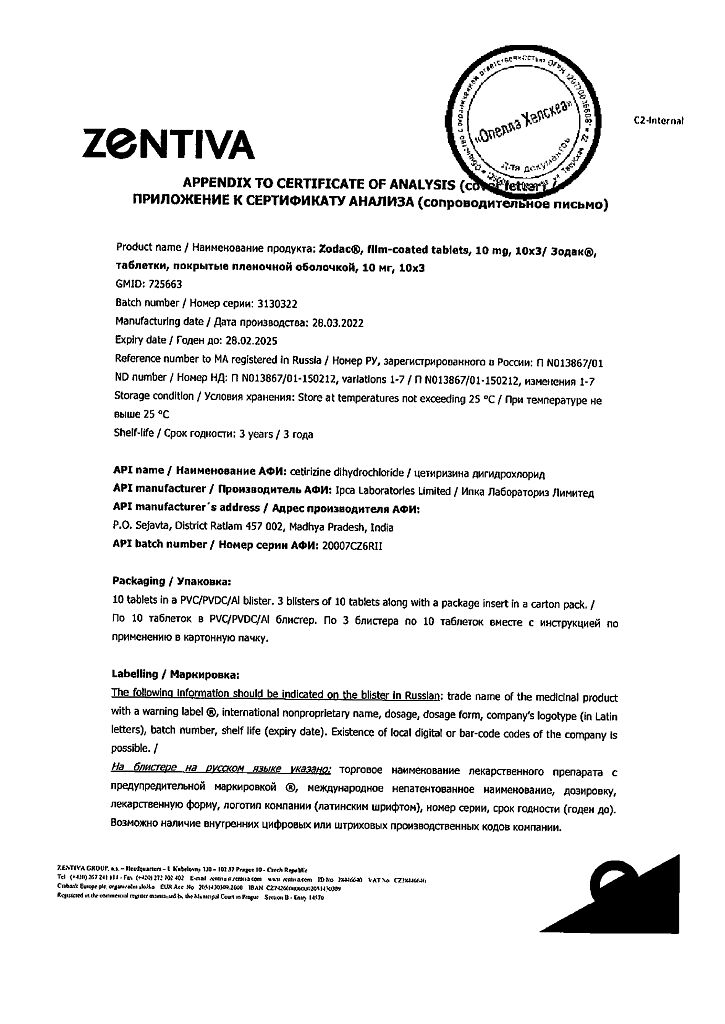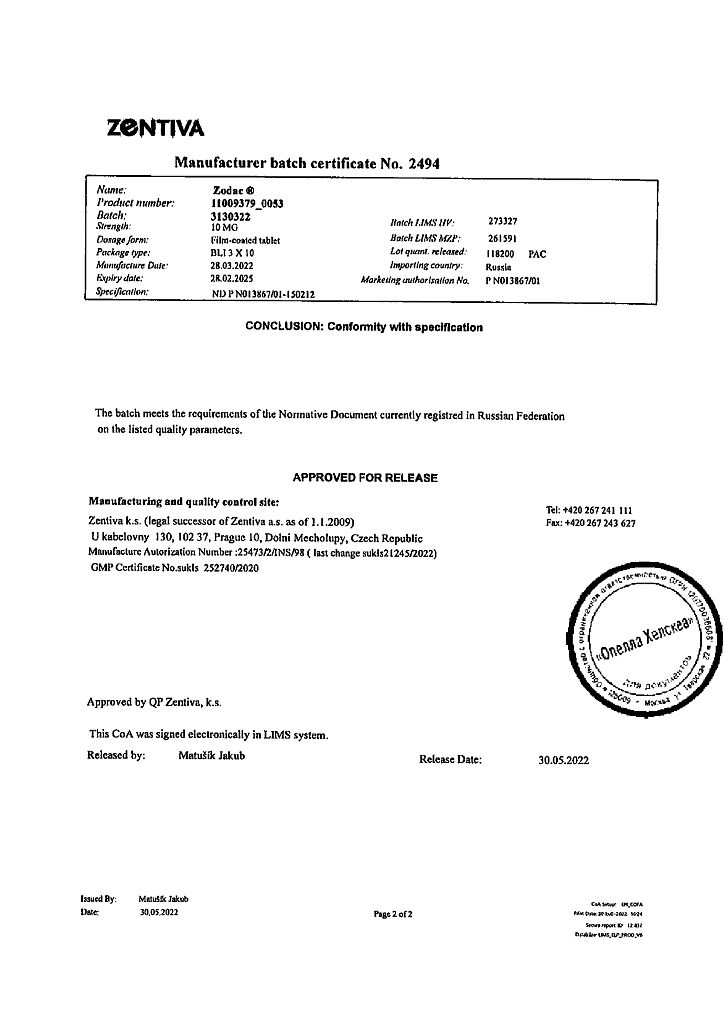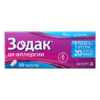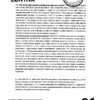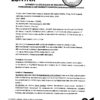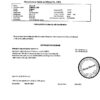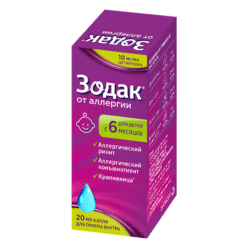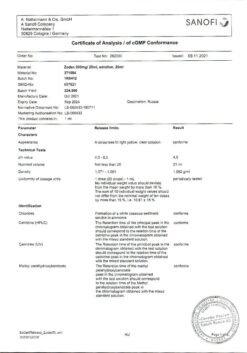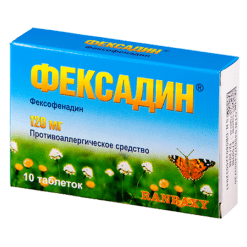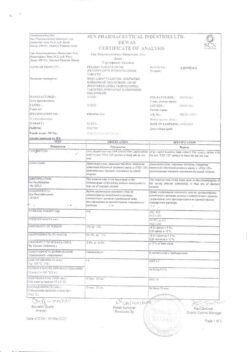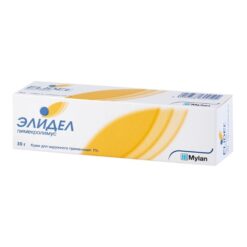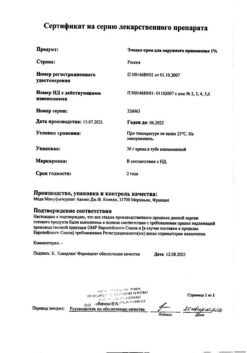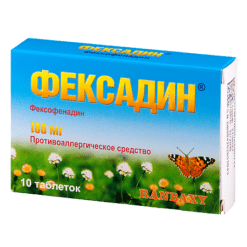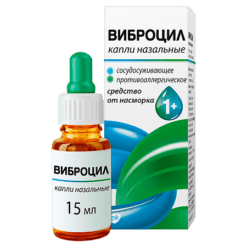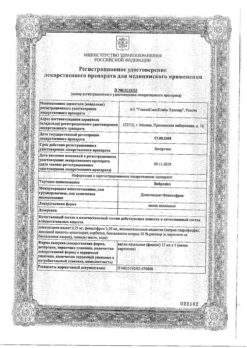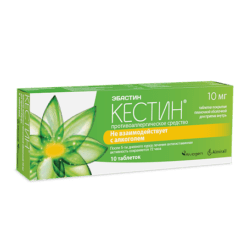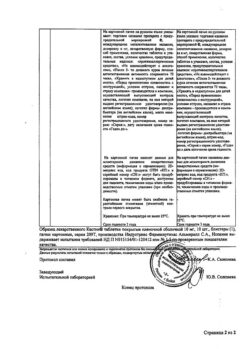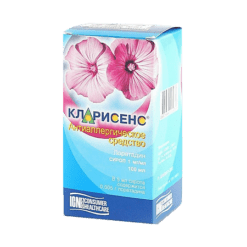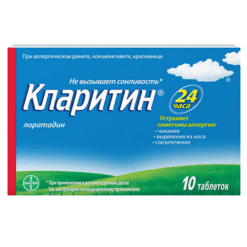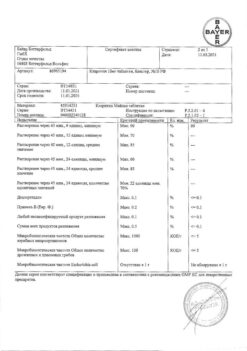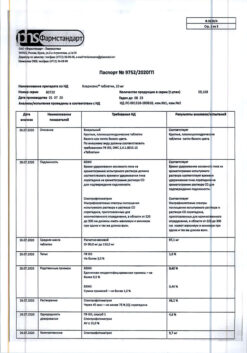No products in the cart.
Description
Zodak is an anti-allergic.
Pharmacodynamics
Cetirizine belongs to the group of competitive histamine antagonists, blocks H1-histamine receptors, almost has no anticholinergic and antiserotonin action. It has a pronounced anti-allergic effect, prevents the development and facilitates the course of allergic reactions. It has antipruritic and antiexudative effects.
It affects the early stage of allergic reactions and also decreases migration of inflammatory cells; it inhibits release of mediators participating in the late allergic reaction. Reduces capillary permeability, prevents the development of tissue edema, relieves smooth muscle spasm. It eliminates the skin reaction to the introduction of histamine specific allergens, as well as to cooling (with cold urticaria). In therapeutic doses there is practically no sedative effect. Tolerance does not develop during a course of treatment.
The action of the drug starts within 20 minutes (in 50% of patients), after 1 hour (in 95% of patients) and lasts for 24 hours.
Pharmacokinetics
Intake. After oral administration, cetirizine is quickly and well absorbed from the gastrointestinal tract. Tmax is approximately 30-60 min.
Eating has no significant effect on the absorption value, but in this case the absorption rate is slightly reduced.
Distribution. Cetirizine binds to blood plasma proteins by approximately 93%. Vd value is low (0.5 l/kg), the drug does not penetrate inside the cell. The drug does not penetrate through the HEB. It penetrates into breast milk.
Metabolism. Cetirizine is weakly metabolized in the liver to form an inactive metabolite. No accumulation of the drug is observed with 10-day use at a dose of 10 mg.
Elimation. About 70% is through the kidneys, mostly unchanged.
The value of systemic clearance is about 54 ml/min.
After a single single single dose, the T1/2 value is about 10 hours. In children aged 2 to 12 years, the T1/2 value is reduced to 5-6 h. Hemodialysis is ineffective.
Pharmacokinetics in special groups of patients
Patients with impaired renal function. In patients with impaired renal function (creatinine Cl below 11-31 ml/min) and in patients on hemodialysis (creatinine Cl less than 7 ml/min), the T1/2 is increased 3-fold and Cl is decreased by 70%.
Patients in the elderly and patients with chronic diseases. In the background of chronic diseases and in elderly patients, there is a 50% increase in T1/2 and a 40% decrease in Cl
Advanced for film-coated tablets
Patients with chronic liver disease (hepatocellular, cholestatic and biliary cirrhosis). Patients with cirrhosis have a 50% increase in T1/2 and a 40% decrease in total clearance (dosing regimen adjustment is only required with concomitant decreased glomerular filtration rate).
Indications
Indications
seasonal and year-round allergic rhinitis and conjunctivitis;
itchy allergic dermatoses;
hay fever (hay fever);
urticaria (including chronic idiopathic);
Quincke’s edema.
Pharmacological effect
Pharmacological effect
Zodak – antiallergic.
Pharmacodynamics
Cetirizine belongs to the group of competitive histamine antagonists, blocks H1-histamine receptors, and has virtually no anticholinergic and antiserotonin effects. It has a pronounced antiallergic effect, prevents the development and facilitates the course of allergic reactions. Has antipruritic and antiexudative effect.
Affects the early stage of allergic reactions, and also reduces the migration of inflammatory cells; inhibits the release of mediators involved in a late allergic reaction. Reduces capillary permeability, prevents the development of tissue edema, relieves spasm of smooth muscles. Eliminates skin reactions to the introduction of histamine to specific allergens, as well as to cooling (with cold urticaria). In therapeutic doses it has virtually no sedative effect. During the course of treatment, tolerance does not develop.
The effect of the drug begins after 20 minutes (in 50% of patients), after 1 hour (in 95% of patients) and lasts for 24 hours.
Pharmacokinetics
Suction. After oral administration, cetirizine is quickly and well absorbed from the gastrointestinal tract. Tmax – approximately 30–60 minutes.
Food intake does not have a significant effect on the amount of absorption, but in this case the rate of absorption is slightly reduced.
Distribution. Cetirizine is approximately 93% bound to plasma proteins. The Vd value is low (0.5 l/kg), the drug does not penetrate into the cell. The drug does not penetrate the BBB. Passes into breast milk.
Metabolism. Cetirizine is poorly metabolized in the liver to form an inactive metabolite. With 10-day use at a dose of 10 mg, no accumulation of the drug is observed.
Excretion. Approximately 70% – through the kidneys, mostly unchanged.
The systemic clearance is about 54 ml/min.
After a single dose, the T1/2 value is about 10 hours. In children aged 2 to 12 years, the T1/2 value decreases to 5–6 hours. Hemodialysis is ineffective.
Pharmacokinetics in special groups of patients
Patients with impaired renal function. In case of impaired renal function (Cl creatinine below 11–31 ml/min) and in patients on hemodialysis (Cl creatinine less than 7 ml/min), the T1/2 value increases 3 times, Cl decreases by 70%.
Elderly patients and patients with chronic diseases. Against the background of chronic diseases and in elderly patients, there is an increase in T1/2 by 50% and a decrease in Cl by 40%
Additionally for film-coated tablets
Patients with chronic liver diseases (hepatocellular, cholestatic and biliary cirrhosis of the liver). In patients with liver cirrhosis, there is an increase in T1/2 by 50% and a decrease in total clearance by 40% (adjustment of the dosage regimen is required only with a concomitant decrease in glomerular filtration rate).
Special instructions
Special instructions
Patients with impaired liver and/or kidney function and the elderly should consult a doctor before taking the drug (see “Pharmacokinetics”, “Dosage and Administration”).
Impact on the ability to drive a car or perform work that requires increased speed of physical and mental reactions. During the treatment period, it is necessary to refrain from engaging in potentially hazardous activities that require increased concentration and speed of psychomotor reactions.
The simultaneous use of drugs that depress the central nervous system and alcohol is not recommended.
Active ingredient
Active ingredient
Cetirizine
Composition
Composition
1 tablet contains 10 mg of cytirizine dihydrochloride;
excipients:
Lactose monohydrate,
corn starch,
povidone,
Magnesium stearate,
hydroxypropyl methylcellulose,
macrogol,
talc,
titanium dioxide,
dimethicone emulsion.
Pregnancy
Pregnancy
Contraindicated: pregnancy and lactation.
Contraindications
Contraindications
hypersensitivity to the components of the drug;
pregnancy;
lactation period;
children under 6 years of age (for tablets); up to 1 year (for drops).
With caution: chronic renal failure of moderate and severe severity (correction of the dosage regimen is required), old age (possible decrease in glomerular filtration).
Side Effects
Side Effects
From the digestive system: dry mouth, dyspepsia.
From the central nervous system: headache, drowsiness, fatigue, dizziness, agitation, migraine.
Allergic reactions: skin rash, angioedema, urticaria, itching.
Interaction
Interaction
No clinically significant interactions of cetirizine with other drugs have been established.
Overdose
Overdose
Symptoms: possible drowsiness, lethargy, weakness, fatigue, headache, tachycardia, increased irritability, urinary retention, dry mouth, constipation (most often when taking 50 mg of cetirizine per day).
Treatment: symptomatic therapy. Gastric lavage, administration of activated carbon. A specific antidote has not been identified. Hemodialysis is ineffective.
Storage conditions
Storage conditions
At a temperature not exceeding 25 °C
Shelf life
Shelf life
3 years
Manufacturer
Manufacturer
Zentiva k.s., Czech Republic
Additional information
| Shelf life | 3 years |
|---|---|
| Conditions of storage | At a temperature not exceeding 25 °C |
| Manufacturer | Zentiva k.s., Czech Republic |
| Medication form | pills |
| Brand | Zentiva k.s. |
Other forms…
Related products
Buy Zodak, 10 mg 30 pcs. with delivery to USA, UK, Europe and over 120 other countries.

